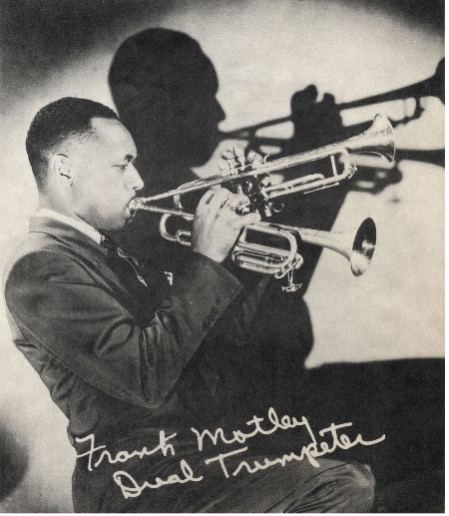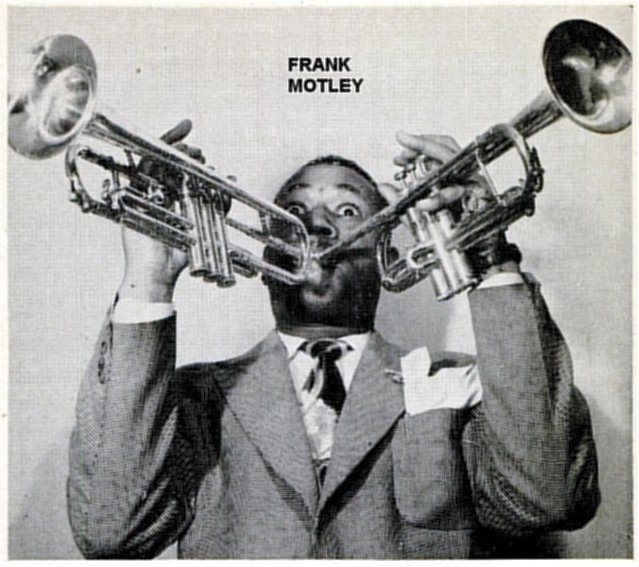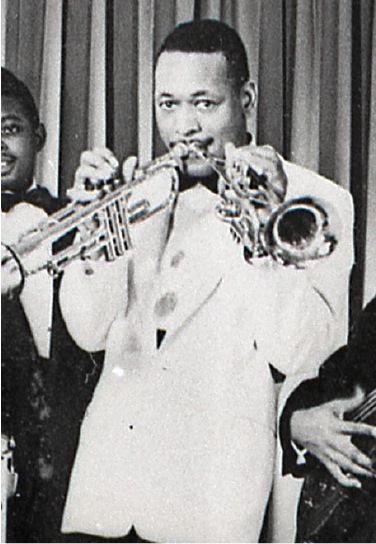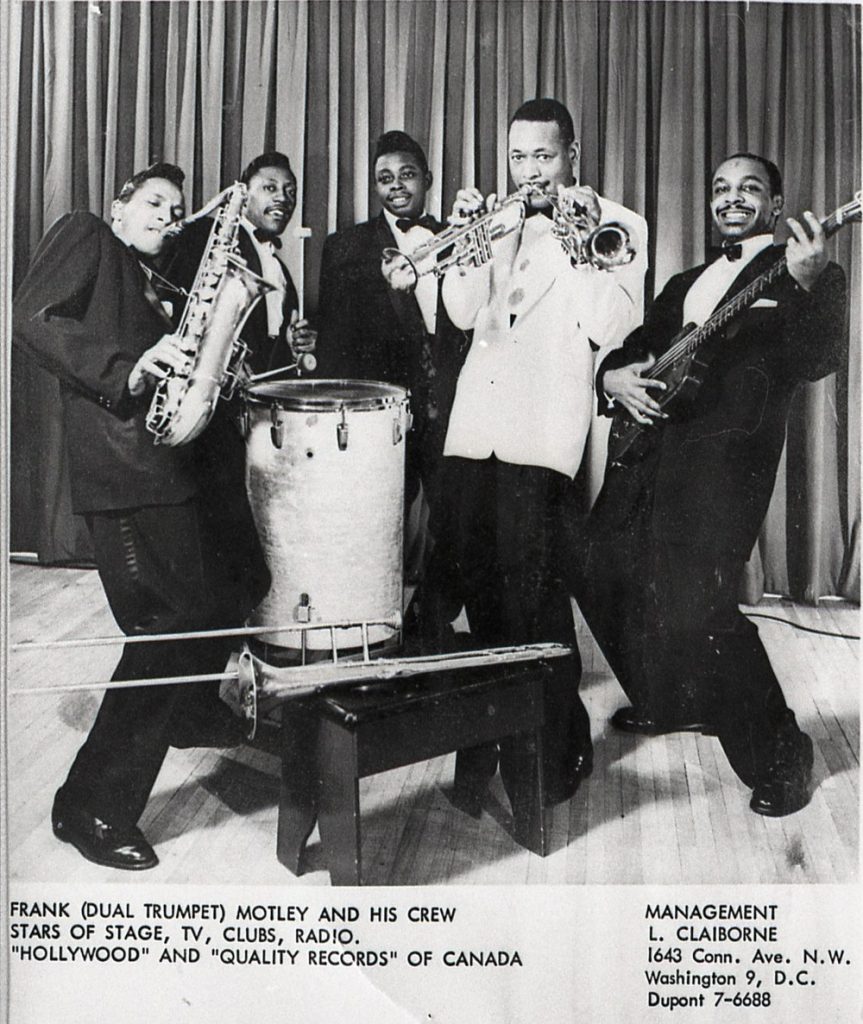1923 - 1999
Frank "Dual Trumpet" Motley
Frank Motley was a talented musician and entertainer who for a few short years in the early 1950s forged a new instrumental sound in rhythm and blues based out of Washington. Perhaps best known for his ability to play two trumpets at once Frank was a well-trained musician who also had a knack for entertaining a crowd. While none of his many recordings hit the national sales charts, several of his titles made under the auspices of Mrs. Lillian Claiborne and her DC Records operation have achieved cult status. "Honkin' At Midnight" from 1955 and "Space Age" from 1958 are two fine examples.
Born in Cheraw, South Carolina in 1923. He grew up as a protégé of Dizzy Gillespie and attended South Carolina A&T before enlisting in the U.S. Navy "B" Band program before the end of the Second World War. He was assigned to the Bluejackets Band at Pensacola Naval Air Station, and was released from active duty in 1946. Heading to New York, he quickly learned from an older brother that New York was full of talented trumpeters. He headed west to join the territory bands of Nat Towles, Terry Holder, and Preston Love. During a sojourn at the Chicago Conservatory of Music he taught himself the trick of playing two trumpets at once. Musically, this technique muddied his sound, but on stage it was a sight to behold.
In about the summer of 1950 he joined a carnival or circus that was working its way east. His objective was Washington, D.C. the home of a young woman he had met earlier in the year. Arriving in late 1950 or early 1951 he made himself know on the local scene. He was spotted by Mrs. Lillian Claiborne who ran a small record company, a music publishing operation, and a booking service. She convinced Frank to team with drummer TNT Tribble. By March 1951 she landed a recording contract for Frank Motley and his Motley Crew with Gotham Records of Philadelphia. Two records (four songs) were released. None hit, but the hard edge he put on D.C. R&B echoed through other bands such as The Crawford Brothers throughout the 1950s. When Mrs. Claiborne landed a contract for Tribble with RCA Victor. Frank was still under contract to Gotham so could only assist. Once the Gotham contact expired, he enjoyed a series of release on several different labels including DC, Chess, Gem Specialty, Hollywood.
Born in Cheraw, South Carolina in 1923. He grew up as a protégé of Dizzy Gillespie and attended South Carolina A&T before enlisting in the U.S. Navy "B" Band program before the end of the Second World War. He was assigned to the Bluejackets Band at Pensacola Naval Air Station, and was released from active duty in 1946. Heading to New York, he quickly learned from an older brother that New York was full of talented trumpeters. He headed west to join the territory bands of Nat Towles, Terry Holder, and Preston Love. During a sojourn at the Chicago Conservatory of Music he taught himself the trick of playing two trumpets at once. Musically, this technique muddied his sound, but on stage it was a sight to behold.
In about the summer of 1950 he joined a carnival or circus that was working its way east. His objective was Washington, D.C. the home of a young woman he had met earlier in the year. Arriving in late 1950 or early 1951 he made himself know on the local scene. He was spotted by Mrs. Lillian Claiborne who ran a small record company, a music publishing operation, and a booking service. She convinced Frank to team with drummer TNT Tribble. By March 1951 she landed a recording contract for Frank Motley and his Motley Crew with Gotham Records of Philadelphia. Two records (four songs) were released. None hit, but the hard edge he put on D.C. R&B echoed through other bands such as The Crawford Brothers throughout the 1950s. When Mrs. Claiborne landed a contract for Tribble with RCA Victor. Frank was still under contract to Gotham so could only assist. Once the Gotham contact expired, he enjoyed a series of release on several different labels including DC, Chess, Gem Specialty, Hollywood.
By the mid-1950s, that was after years of hard touring, Frank realized the Canadian audiences had been, and continued to be, very receptive. By 1955 he moved The Motley Crew to Toronto where they held steady gigs at the local clubs. The band frequently returned to the U.S. to renew their entry visas, and Frank made a point of visiting his Washington family and Mrs. Claiborne annually.
In the 1960s Frank's association with Jackie Shane charted another course for the band centered on
Canadian soul music. He also worked with his longtime sideman, Curley Bridges, in the band Bridge Crossing. He was effectively retired by the early 1980s when he endured a series of cardiac problems and diabetes. He returned to the Carolina's to live at the Hosiery Mill senior center in Durham, N.C. He continued to drop in and play with visiting bands, but his diabetes gradually robbed him of the ability to perform. He died in 1999 at the age of 75. Since his death his recordings, both those done in the U.S. and those done in Canada have been rediscovered by a new generation of music fans.
In the 1960s Frank's association with Jackie Shane charted another course for the band centered on
Canadian soul music. He also worked with his longtime sideman, Curley Bridges, in the band Bridge Crossing. He was effectively retired by the early 1980s when he endured a series of cardiac problems and diabetes. He returned to the Carolina's to live at the Hosiery Mill senior center in Durham, N.C. He continued to drop in and play with visiting bands, but his diabetes gradually robbed him of the ability to perform. He died in 1999 at the age of 75. Since his death his recordings, both those done in the U.S. and those done in Canada have been rediscovered by a new generation of music fans.
Frank "Dual Trumpet" Motley
Courtesy of Jay Bruder



